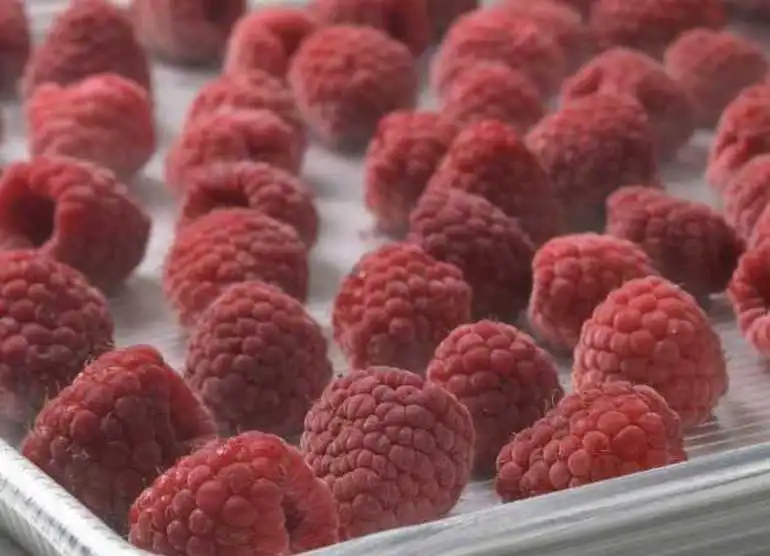According to EastFruit analysts, farmers in Poland on June 29, 2023 blocked the first raspberry freezing enterprise in response to what they consider to be unsatisfactory prices for raspberries offered by processors. We are talking about the purchase price of 5 zł per kg, which is equivalent to $1.22 US dollars per kg or 1.12 euros per kg.
Well, Ukrainian farmers can only dream of such a high price level in 2023, but Polish farmers consider it unacceptable. Now in Ukraine procurement raspberry prices for freezing range from $0.5 to $0.8 US dollars per kg. Thus, in Ukraine, prices are now twice as low as Poland and yes, Ukrainian farmers aren’t happy either!
Recently we posted a very detailed overview of the situation on the raspberry markets in Poland, Serbia, Ukraine and Moldova. If you wish to compare prices in these countries as well as learn about the supply and demand situation with specific figures, we suggest you read this report.
According to Polish media reports, local farmers intend to block Pol Owoc freezing factory until they receive at least PLN 8 per kg of supplied raspberries, which is about $2 per kg. This price farmers in Poland consider to be the minimum fair price for the industrial raspberries for freezing.
By the way, in addition to the requirements for processors to increase the purchase price for raspberries, farmers also put forward demands on the government to ban fruit imports from Ukraine and Moldova. Polish farmers naively believe that it was cheap raspberries from Ukraine that led to a drop in prices for their fruits. In addition, Polish farmers demand to limit or ban fruit imports from Moldova, which they also consider a direct threat to their business.
“Unfortunately, farmers do not understand that the raspberry market has a certain cyclicity, which is described in detail in our article “Raspberry Price Cycles”. That is why two years ago we warned the global market of an inevitable collapse in raspberry prices worldwide. Ukraine itself has nothing to do with it – production of raspberries was expanding in many countries of the world. Moreover, Ukraine is the only reason why Poland remains among the world leaders in the exports of frozen raspberries. After all, about a third of all raspberries exported by Poland are Ukrainian berries frozen in Ukraine, on which Poland market participants make very good money,” explains Andriy Yarmak, an economist at the Investment Centre of the Food and Agriculture Organization of the United Nations (FAO).
“If Poland bans imports of fresh and frozen raspberries from Ukraine, then Ukraine will start exporting them directly, which will allow Ukrainian exporters to offer an even lower price for their products on the world market, since intermediaries from Poland are now collecting this additional margin. This will further collapse the prices for frozen raspberries on the global market, and Polish farmers will only have to dream of the price they are offered now. If a decision is made to ban imports of raspberries from Ukraine for a long time, within 3-4 years, Ukraine will be able to overtake Poland in terms of exports of this product, and the price of raspberries in Poland will not increase at all,” Andriy Yarmak believes.
Farmers from Poland also need to understand that in response to discriminatory measures in relation to Ukraine’s berries, Ukraine can also introduce retaliatory measures regarding imports of food from Poland. This will negatively impact many sectors of agriculture in Poland, not only the berry sector. However, in Poland, farmers plan only to intensify the protests – even more massive protests are expected from Monday, blockades of roads and enterprises in the Lublin Voivodeship, where the bulk of Poland’s raspberries are grown.
In our opinion, these protests will only exacerbate the problems of Polish raspberry growers – after all, raspberries are a perishable product, and every day of plant downtime is an irretrievably lost income for growers. In addition, if a raw material base for raspberries is currently being formed in Ukraine at a significantly lower cost than in Poland. It means that the increase in the price of raw materials from the Polish freezer is already a direct threat to the sustainability of their entire business.
Analytical team of EastFruit believes that global prices of frozen raspberries are very likely to continue declining from July onwards, which means that wishes of Polish growers can’t be fulfilled by the business. Unless the government decides to support or subsidize the sector, they will probably end up having to agree to even lover prices as the season goes on.
The use of the site materials is free if there is a direct and open for search engines hyperlink to a specific publication of the East-Fruit.com website.




